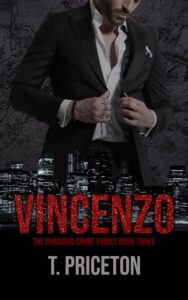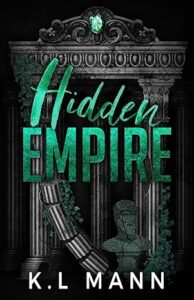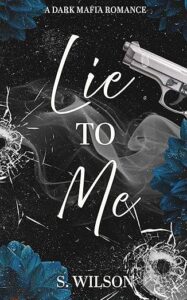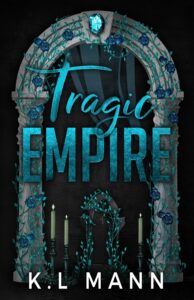The next morning rises slowly over Nuova Speranza, with streaks of pale light brushing through linen curtains like it knows better than to be too bold in a house like this.
I stir beneath the cotton sheet, momentarily caught between the rhythm of Gabriel’s breathing and the memories that never stop chasing me.
For a moment, I forget where I am.
Then I remember the silence.
The south house.
The choice that wasn’t really a choice.
Gabriel sleeps on, curled in the smaller bed beside mine, his stuffed lion tucked against his chest, its mane matted from years of being held too tightly.
I leave him be, slipping quietly into the bathroom and washing the night from my skin with the care of someone who no longer trusts the luxury of warm water.
The mirror above the sink reflects a woman I am still learning to forgive.
When I dress and make my way through the house, it is quiet. The rooms are as they were last night: clean, sparse, functional.
No carvings in the moldings, no velvet curtains, no scent of roses in the air.
Just wood and stone and silence.
Luca has made his message clear. This is not a place of comfort. It is a crucible. But Gabriel and I have lived in worse. We have survived on less.
I drift past the kitchen, pausing to pour a glass of water.
The glass clinks too loudly in the stillness, a brittle reminder that I do not belong here, not yet.
I glance out the window.
The olive trees in the garden stretch into the horizon, their limbs silvered by dew and memory.
Somewhere beyond them lies the road to the city. And further still, the road to the dead.
Before going out, I type a message to Enzo and hit send. Gabriel is asleep, and you have keys. Please come if you have the time.
About ten minutes later, there’s a brief knock on the door, and Enzo steps inside, sleep evident on his face. ‘I’m here,’ he says quietly.
I nod. ‘Can I go out?’
He doesn’t ask, not in the way he would have five years ago. He simply dips his head. ‘Be safe.’
I take a coat from the hook by the door and slip outside. The air bites sharply at first, then warms against my skin.
The security detail assigned to the perimeter says nothing when I pass through the gate. They know who I am now. Or rather, who I used to be.
I hail a taxi with cash I’d tucked into the lining of my coat—a habit from another life.
The driver does not ask questions when I give him the name of the neighborhood.
He only nods and drives.
The city unfolds around us in layers of stone and scaffolding. People bustle through markets, shout across alleyways, hang laundry between weathered balconies. Nuova Speranza never changes. It only forgets who was here last.
The car slows when we reach what remains of the Lombardi estate.
There is no gate anymore, only rusted hinges and weeds.
The front courtyard is cracked and empty, the fountain choked with moss and silence.
The house itself is nothing but a shell now, a skeleton of its old glory. Fire took the roof. Rain took the rest.
But I don’t walk toward the main house. I walk to the servants’ wing.
The door creaks, the hinges sighing like they remember me.
I step inside.
Dust lies thick on the tiles, but the space is intact.
Luciana’s bed is gone. So is the old trunk at the foot of it.
But there are still scraps—a faded scarf I remember her wearing in winter, a book of recipes stuffed into a kitchen drawer. There is a letter pinned to the corkboard near the stove.
The date is from two years ago.
Aria,
I am leaving this letter, and if you ever come back, know that I am alive, but gone. I am leaving this place. There is no life in it with you gone. I will take a job with Doctor Rivetti in Altavilla. He says he needs help with the patients. I told him I don’t know much about medicine, but he said what I do know is enough. If you come back, if by some miracle you live through this, you can find me there.
Please. Just find me.
L.
Altavilla. I know the town.
A fishing village not far away.
It’s known for being cold and quiet, so definitely the kind of place you go when you don’t want to be found. I take the note, fold it into my coat, and leave the house the way I came.
The next cab takes me further south. Along winding roads and through salt-heavy air. The doctor’s address leads me to a modest building nestled between two olive groves. There is a small plaque by the door. No receptionist. Just a bell. I press it.
Luciana opens the door, sees me and clasps a hand over her mouth to keep from crying out in surprise.
Her hair is longer now, drawn back in a bun. Her face has thinned, but her eyes… god, the light in them is as sweet as it ever was.
‘Aria,’ she breathes.
I fall into her arms.
She leads me inside, sits me down in the kitchen with a cup of tea before I can speak. Her hands shake slightly, but her voice is steady.
‘I thought you were dead. We all did. The crash…the estate…your parents…’
‘I know,’ I whisper.
‘The Salvatore men came through like pirates. Took everything. Burned the rest. Your mother begged them to spare the chapel. They did not.’
I nod. I knew already. But hearing it from her, the pain roots deeper.
‘You’ve been here long?’
‘Two years. Doctor Rivetti takes in patients that the hospitals won’t touch. War men, old criminals, girls too scared to say their names. I cook. I clean. I write letters no one answers.’
Her lower lip trembles briefly, but she presses on. ‘And you? You have a child. I saw the picture in your pocket when you hugged me.’
‘His name is Gabriel.’
She smiles, and it breaks my heart. We fall into silence, the kind that only old grief can carve. Then Luciana leans in slightly. ‘Word is being spread, even this far down,’ she says. ‘They say Luca Salvatore is no longer what he was.’
I stiffen. ‘Who says that?’
‘Men who pass through here with wounds they won’t explain. Businessmen who no longer use his name at ports. Even the doctor has heard it.’
‘You believe it?’
She hmms thoughtfully. ‘I believe something is moving beneath him. Someone. I’ve seen this before. A king never falls by a blade. He falls by shadow.’
Her eyes narrow. ‘And your Enzo?’
‘Still loyal. Still dangerous.’ I scratch my throat tentatively.
She shakes her head, her eyes growing deep with worry. ‘Then watch him. If there is rot inside the house, it will come for him first.’
Her words make me shiver, even as I finish the sweet, hot tea. We hug again, tighter this time. She presses a small card into my hand. ‘Come back when you can. And if not, write.’
I promise I will. I step outside.
The air has cooled slightly, the sun dipping behind the hills as I get into another taxi and head back to the Salvatore estate. I reach it just past sundown.
On arriving at the south house, I hear voices—the murmur of voices down the hall, and a softer sound that makes me pause. Laughter. Gabriel’s.
I walk slowly toward the main room, the morning sun slanting through the tall windows, casting long bars of light across the floors.
There, near the small kitchen table, I see Enzo is crouched beside Gabriel, helping him piece together a wooden puzzle that must have been brought in while I was gone.
His sleeves are rolled, his forearms braced on the table, and the curve of his mouth is soft in a way I had forgotten he was capable of. Gabriel grins as he fits the last piece, and Enzo reaches over to ruffle his hair.
It is a scene I do not expect to see.
And one I know I will never forget.
‘He woke early,’ Enzo says without looking up. ‘Said he was hungry, so I made eggs. Burned the first batch.’
Gabriel looks up, beaming when he sees me. ‘Mama, he said he used to make puzzles too, with his brothers. Did you know that?’
‘I didn’t,’ I say, walking over, brushing the hair from Gabriel’s brow. I didn’t even know Enzo had brothers. I kiss the top of his head and look at Enzo. ‘Thank you.’
‘You should go rest,’ he says. ‘I have him.’
But I do not rest. Instead, once Gabriel is distracted by a book in the corner, I draw Enzo toward the outer hallway, away from listening ears and soft, innocent questions.
We stand by the window where the vines are just starting to bloom along the stone. The estate stretches beyond the glass, shadowed and old, and the silence between us is heavy, not with anger, but with what must be said.
‘There’s talk,’ I say, watching his profile. ‘In the city. Even in the ruins of my house.’
Enzo does not turn to me. ‘What kind of talk?’
‘That Luca is not as strong as he once was. That there are fractures beneath the surface. Even the old housekeeper knew something was wrong. And she hasn’t stepped foot inside these walls in a decade.’
He says nothing for a moment. I see the line of his jaw tighten.
‘Enzo,’ I murmur, ‘if you want me to survive this, if you want me to do more than just stay alive, you need to trust me. I cannot win Luca’s favor blindly. If there is something tearing at this house, I need to know what it is.’
He turns then. Slowly. His eyes meet mine, darker than I remember, not with anger, but with the kind of restraint that comes after years of knowing when to speak and when silence is safer. After a pause, he looks out over the hill, where the rooftops of Nuova Speranza curve against the horizon like ribs of a sleeping giant.
‘Matteo said something similar,’ he says finally. ‘When I questioned him.’
I look at him sharply. ‘Matteo?’ I had been right, then. He had seen me, and news had traveled very fast from there.
Enzo confirms as much. ‘He was the one who saw you. Down near Volterra. He was moving cargo for us.’
‘What did he say?’
Enzo sighs, and his eyes meet mine once more. This time, the light in them is soft, almost sad. ‘That he didn’t recognize you at first. Said it took time. But when it struck him—when he knew who you were—he had to report back. Duty.’
I swallow hard. ‘And the rumors?’
Enzo frowns as he speaks. ‘He said people talk. That Luca’s name doesn’t carry the same fear it used to. That some of the younger crews don’t flinch when they hear it.’ Enzo’s eyes narrow slightly. ‘He said it like it didn’t matter. Like it was just wind through the trees. But I’ve seen enough to know it isn’t just talk.’
I furrow my brows at him. ‘What do you mean?’
‘The job before Luca sent me after you. A villa in Dubrovnik. Quiet courier run turned inside out. Stefano Amari. Ex-Conti muscle. Turned coat.’
No guesses what’s happened to him.
‘He was being paid to watch the docks, but not by us. Someone else. Someone feeding him names. He laughed before I ended it. Said it was a gift from the inside. Said we’d see worse before it was over.’
My hands grip the stone wall. ‘And you don’t know who?’
‘No. But I can feel it. Something’s off.’ He sighs and rubs his face tiredly. ‘You think this matters for you. That knowing gives you a weapon. But Luca won’t crumble from rumors. He has bled too much into this earth. He survives by turning the knife inward. If he suspects weakness, he will tighten the leash, not loosen it.’
Before I can ask more, a voice cuts across the path.
‘There you are.’
Giovanni steps out from behind the nearest tree, his smile a touch forced. ‘I was looking for you, Enzo. Luca wants an update on the south docks.’
Enzo nods once, his body already shifting into that posture I’ve come to recognize. Giovanni’s eyes flick to me. He gives a little bow, theatrical but not mocking.
‘Aria. Always a pleasure.’
Something in his tone catches at the edges of my mind. I smile politely, but my spine stiffens.
Enzo brushes my hand briefly, then follows Giovanni down the path.
I watch them go. Something in Giovanni’s gait is too smooth. His timing is too precise. The way he turned up just as our conversation reached its sharpest point. I cannot name it. But it sits wrong.
And I’ve learned to trust when something sits wrong.













